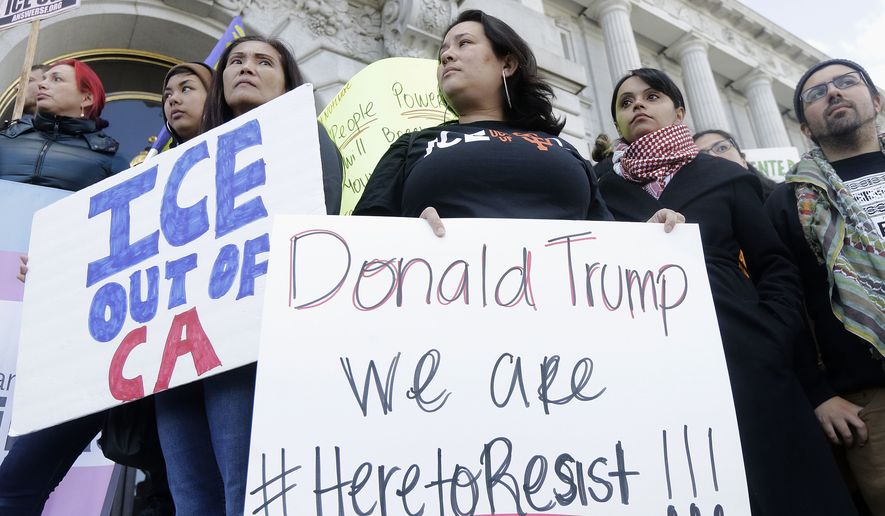A federal appeals court ruled President Trump’s executive order punishing sanctuary cities by withholding money is unconstitutional — but in a twist, the court cleared the way for the government to carry out the policy in much of the country.
The 9th U.S. Circuit Court of Appeals ruled that Mr. Trump tried to steal Congress’s powers when his administration added new conditions to Justice Department grants by requiring cities and counties to cooperate with immigration authorities.
But the appeals court vacated Judge William H. Orrick’s nationwide injunction, saying he hadn’t proved there was a need to apply his ruling outside California.
That, combined with a similar ruling out of an appeals court in Chicago weeks ago, could pave the way for Mr. Trump to carry out his anti-sanctuary policy in most of the country.
Still, the ruling was the latest rebuke for a president who came to office determined to crack down on sanctuary cities, only to see them expand their number and scope.
“This is why we have courts. When a president overreaches and tries to assert authority he doesn’t have under the Constitution, there needs to be a check on that power grab,” said Dennis Herrera, city attorney in San Francisco, one of the jurisdictions that sued to stop the anti-sanctuary policy.
At issue was an executive order Mr. Trump issued during his early days in office ordering his government to strip federal funds from states, cities and counties that resist cooperating with U.S. Customs and Border Protection or Immigration and Customs Enforcement, the two chief agencies for enforcement of immigration laws.
Mr. Trump pointed to a federal law that requires localities taking Justice Department grant money to agree to let officers share information on immigration status with the federal government.
Attorney General Jeff Sessions said he was carrying out the executive order and federal law by imposing new conditions, including that localities agree to notify the government before their police release immigrants who live in the U.S. illegally are targeted for deportation. Mr. Sessions also asked that ICE officers be allowed access to local prisons and jails so they could safely take custody of potential deportees.
The 9th Circuit said those new conditions went beyond what Congress intended, and since Congress has the power of the purse, its decisions are controlling when it comes to spending.
“Absent congressional authorization, the administration may not redistribute or withhold properly appropriated funds in order to effectuate its own policy goals,” Chief Judge Sidney R. Thomas wrote in the majority opinion. “Because Congress did not authorize withholding of funds, the executive order violates the constitutional principle of the Separation of Powers.”
Judge Ferdinand F. Fernandez dissented.
He said the case wasn’t yet ripe, but if it were, he would have allowed the executive order to remain in effect to see how the administration carries it out.
“There can be no doubt that the president had the authority and the duty to see that duly adopted laws were faithfully executed, and to direct his subordinates to that end,” the judge wrote. “One way a president does that is through executive orders … That is what the president did here.”
The ruling is similar to a case out of Chicago, where another appeals court likewise found the grant conditions illegal, but also ruled against a nationwide injunction.
Overall, Mr. Trump has been on a losing streak in the federal courts on immigration policy in general, and on sanctuary cities in particular.
Judges in Philadelphia, Chicago and California have ruled against his crackdown. The Philadelphia judge even ruled that the federal law requiring information sharing is likely unconstitutional.
A judge in California, meanwhile, has upheld most of that state’s sanctuary policies, giving California broad power to shut federal agents out of prisons and jails, and giving the state the power to monitor federal immigration detention facilities within its borders.
Anti-sanctuary supporters did win a victory in Texas, where a federal appeals court upheld that state’s law punishing any localities that wanted to adopt sanctuary policies.
None of the cases has reached the Supreme Court.
• Stephen Dinan can be reached at sdinan@washingtontimes.com.




Please read our comment policy before commenting.